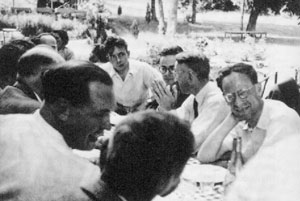Probably the smartest move I’ve made after entering math-school was to fall in love with a feminist.
Yeah well, perhaps I’ll expand a bit on this sentence another time. For now, suffice it to say that I did pick up a few words in the process, among them : the queen bee syndrome :
women who have attained senior positions do not use their power to assist struggling young women or to change the system, thereby tacitly validating it.
A recent study by the Max Planck Institute for Human Development asserts that the QBS
likely stems from women at the top who feel threatened by other women and therefore, prefer to surround themselves with men. As a result, these Queen Bees often jeapordize the promotions of other females at their companies.
Radical feminists of the late 70-ties preferred a different ‘explanation’, clearly.
Women who fought their way to the top, they said, were convinced that overcoming all obstacles along the way made them into the strong persons they became. A variant on the ‘what doesn’t kill you, makes you stronger’-mantra, quoi. These queen bees genuinely believed it to be beneficial to the next generation of young women not to offer them any shortcuts on their journey through the glass ceiling.
But, let’s return to mathematics.
By and large, the 45+generation decides about the topics that should be (or shouldn’t be) on the current math-curriculum. They also write most of the text-books and course-notes used, and inevitably, the choices they make have an impact on the new generation of math-students.
 Perhaps too little thought is given to the fact that the choices we (yes, I belong to that age group) make, the topics we deem important for new students to master, are heavily influenced by our own experiences.
Perhaps too little thought is given to the fact that the choices we (yes, I belong to that age group) make, the topics we deem important for new students to master, are heavily influenced by our own experiences.
In the late 60ties, early 70ties, Bourbaki-style mathematics influenced the ‘modern mathematics’ revolution in schools, certainly in Belgium through the influence of George Papy.
In kintergarten, kids learned the basics of set theory. Utensils to draw Venn diagrams were as indispensable as are pocket-calculators today. In secondary school, we had a formal axiomatic approach to geometry, we learned abstract topological spaces and other advanced topics.
Our 45+generation greatly benefitted from all of this when we started doing research. We felt comfortable with the (in retrospect, over)abstraction of the EGAs and SGAs and had little difficulties in using them or generalizing them to noncommutative levels…
Bourbakism made us into stronger mathematicians. Hence, we are convinced that new students should master it if they ever want to do ‘proper’ research.
Perhaps we pay too little attention to the fact that these new students are a lot worse prepared than we were in the old days. Every revolution inevitably provokes a counter-revolution. Secondary school mathematics sank over the last two decades to a debilitating level under the pretense of ‘usability’. Tim Gowers has an interesting Ivory tower post on this.
We may deplore this evolution, we may try to reverse it. But, until we succeed, it may not be fair to freshmen to continue stubbornly as if nothing changed since our good old days.
Perhaps, Bourbakism has become our very own queen bee syndrome…
Comments